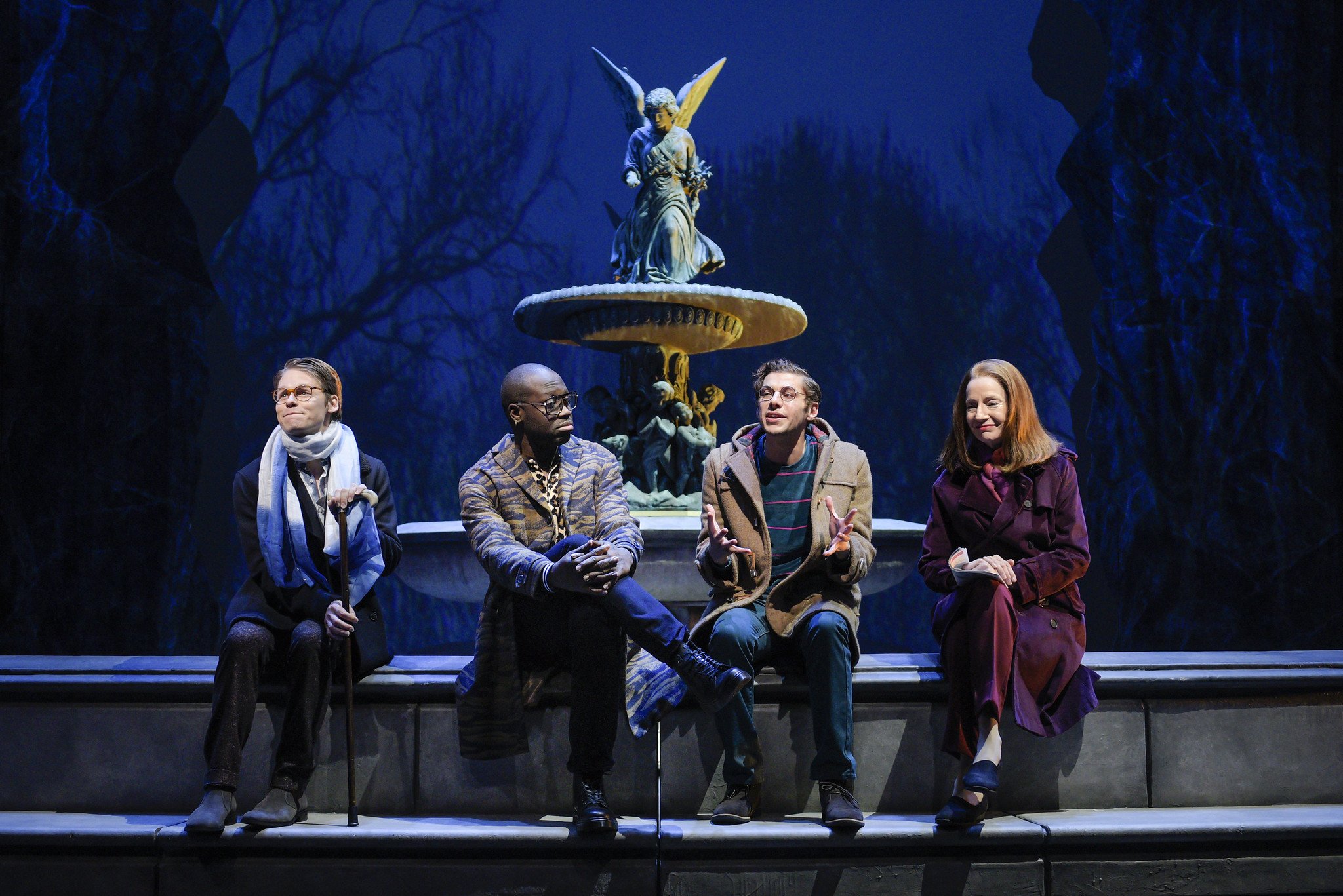

Vivacious Aztec tunefully reclaims, re-writes Latinx history
After 33 years at Berkeley Repertory Theatre – 22 as artistic director – Tony Taccone is taking a final bow with Kiss My Aztec, a world-premiere musical that serves as a fitting farewell. Hatched from the fervid mind of John Leguizamo, the show hits a lot of Taccone hot spots. It attempts to stick it to the white man (in this case, the Spanish conquistadors who colonized, destroyed and attempted to erase Aztec civilization) while re-writing history with a focus on those who should have had a hand in recording it in the first place. It's a sprawling, inclusive, celebratory explosion of energy that continually lobs truth bombs at its audience through crude, incisive, often hilarious lines and lyrics.

Hymns of praise for Kushner's Angels at Berkeley Rep
Angels in America is back in the Bay Area, this time at Berkeley Repertory Theatre, where it is directed by Tony Taccone, who, with Oskar Eustis helped bring this play into the world when it premiered at their Eureka Theatre in 1991. The play's staggering genius is on full display in Taccone's marvelous production, as is Kushner's prescience (Russia, Republican politics, the environmental crisis).

Imaginary discomfort rules at Berkeley Rep
The first time I head the title for the new play by Daniel Handler, the San Francisco writer behind the popular Lemony Snicket books, I was confused. Imaginary Comforts, or The Story of the Ghost of the Dead Rabbit is the title, and it wasn't the Snickety-y subtitle that perplexed me. It was the notion that comfort could be imaginary. Isn't comfort comforting no matter where it comes from? You can receive comfort from an external source (a parent, a pet, a narcotic) or you can just imagine comfort (memory, dream, hallucination), but as long as you are comforted, job done...at least for a little while, right?
Berkeley Rep's warning: it can so happen here
Berkeley Repertory Theatre’s It Can’t Happen Here is a nightmare on so many levels, and that’s mostly a good thing in the world-premiere adaptation of Sinclair Lewis’ 1935 novel.
This is the right story at the right time, and therein lies the dark heart of this nightmare.
Quiet beauty, deep feeling in Berkeley Rep's Aubergine
Setting aside taxes for the moment, there are two certainties in life: we will eat food (and perhaps have a complicated relationship with food) and we will die (and perhaps have a complicated relationship with death). Food and death. Elemental.
In Julia Cho's Aubergine, now receiving its world premiere at Berkeley Repertory Theatre's newly renovated and renamed Peet's Theatre (formerly the Thrust Stage), those elements – food and death – are being addressed with the utmost compassion, grace and quiet dignity.
Love and loathing in Berkeley Rep's football drama
A critic's personal feelings or attachment to a subject are often irrelevant when it comes to writing about a particular play. But in the case of Berkeley Repertory Theatre's world premiere of X'x and O's (A Football Love Story), I feel I have to disclose a strong personal bias. I loathe football. LOATHE it, and have all my life. That's my dad and my brother's territory. I'll be in my room canoodling with stereotypes and listening to Broadway cast albums. Sports in general have never interested me much, but no other sporting activity do I actively detest and strenuously ignore as much as loud, violent, overblown football.
Kushner unleashes a familial flood of words at Berkeley Rep
There are probably more English words in Tony Kushner's new play than not in the new play. So many things about The Intelligent Homosexual's Guide to Capitalism and Socialism with a Key to the Scriptures are staggering (including the title), but chief among them is the amount of dialogue – the number of choice words, the overlapping layers of lively conversation, the sheer volume of communication, attempted and otherwise.
If Angels in America was Kushner at his most Kushnerian – fantastical, political, emotional, hysterical, profound – then iHo (as the play is known) is Kushner at his most ktichen sink-ian.
Moscone, Taccone illuminate history in Ghost Light
Jonathan Moscone and Tony Taccone have found the courage to stay out of what they call "the suck drawer."
The phrase comes from Ghost Light, the play Moscone and Taccone conceived together and that Taccone wrote and Moscone directed and it has to do with the life of an artist – the life of anyone, really – and the effort to create work and, ultimately, a life that is true and uniquely individual.
I expected Ghost Light, a co-production of Berkeley Repertory Theatre (where Taccone is artistic director) and the Oregon Shakespeare Festival, where the play had the first leg of its world premiere last summer, to be about grief and the complicated relationship between fathers and sons. It is about those things. How could it not be, seeing as how it deals primarily with the effect of San Francisco Mayor George Moscone's assassination in 1978, when his son Jon was 14 years old.
Enter Stage Left: SF theater history on film
Docuemntary film director/producer Austin Forbord (below right) has created a fascinating documentary about the history of San Francisco theater from the post-World War II days up to the present. The movie has its premeire at the Mill Valley Film Festival this week and will likely see wider release soon after.
I interviewed Forbord for a story in the San Francisco Chronicle. You can read the story here.
Lovely as ever, Rita Moreno tells her tale
She’s charming and gorgeous. Vivacious and soulful. In short, Rita Moreno is the perfect candidate for an autobiographical show.
Rita Moreno: Life Without Makeup is not yet the perfect show for this legendary performer, but it provides a snazzy opening to the Berkeley Repertory Theatre season.
Written by Berkeley Rep Artistic Director Tony Taccone and directed by David Galligan,, the show is at its best when Moreno is taking us through the ups and mostly downs of her storied career. Act 1 is a chronological narrative, beginning with a 5-year-old Rosa Dolores Alverío boarding a ship in 1936 to take them from Puerto Rico to a new life in New York.
From her first meeting with Louis B. Mayer at age 16, Moreno was catapulted from life in the barrio to the world of hardscrabble glamour as a Hollywood starlet who, it’s interesting to note, could have chose the screen name Mitzi Margarita.
What’s so interesting about Moreno’s story is that throughout her career, she was fighting stereotype.
This Composer really is dead
There’s a moment of absolute magic in the world premiere of Lemony Snicket’s The Composer Is Dead now at Berkeley Repertory Theatre.
We’ve just been subjected to a rather dispiriting film (more on that in a minute), a sort of theatrical appetizer, and we’re making the transition into the main course. The curtain on the Roda Theatre rises to reveal an absolutely magnificent set that looks like a life-size Victorian paper theater.
There’s an orchestra full of puppets – each personality-infused face affixed to a representation of an instrument – and Geoff Hoyle (the only human in the show) as the Inspector in a fantastic plaid suit preparing to solve the crime of who murdered the world’s greatest, formerly living composer.
The reveal of the set in all its glory is by far the best part of this strangely moribund evening. The show, including the movie, is just over an hour, and yet it seems much longer.
Heavenly Angels exhibit takes wing
The millennium approached, then quickly fell behind us. Time marches on, but Tony Kushner's Angels in America remains a landmark achievement of 20th century theater.
The legacy of the play that got its start at San Francisco's Eureka Theatre is on display at the Museum of Performance and Design, one of San Francisco's best kept museum secrets. The exhibit hall may be filled with memorabilia from Angels' humble beginnings on a red Formica table filled with scribbled-in notebooks to its domination of world stage (with the Pulitzer Prize and international posters to prove it), but what you really feel in this display is the extraordinary power of theater.
It doesn't happen very often, but when a play or a musical really taps into the American psyche, imaginations are ignited and artists are pushed to do work they didn't know they could do. MPD's curator of exhibitions and programs, Brad Rosenstein, has created a testament to the evanescence of theater. Plays may come and go, but sometimes in their wake, the world changes.